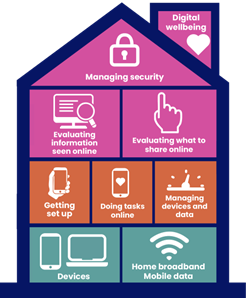Developed in collaboration with members of the public, the Minimum Digital Living Standard (MDLS) highlights the importance of having a combination of devices and internet connection, as well as the knowledge and skills needed to connect, communicate, and engage safely and confidently in today’s digital world.
The MDLS was led by Loughborough University’s Centre for Research in Social Policy (CRSP), the University of Liverpool, Good Things Foundation, and funded by the Nuffield Foundation.
The research builds on an initial study looking at the digital needs of families with children, and now includes a broader range of households.
Discussion groups with working-age adults, pensioners, parents and young people in urban and rural areas identified a set of core must-haves under three categories:
- Digital goods and services (such as a mobile phone, large screen device, TV, and reliable broadband and/or sufficient mobile data)
- Functional knowledge and skills (being able to set up devices and connection, doing tasks online such as searching the internet and using email, managing devices and storage)
- Critical knowledge and skills (relating to online safety, passwords, making payments, evaluating what you see and share, identifying risks and scams, managing social pressures and practicing empathy online)
It also identifies how digital needs vary: for instance, households with children require more devices, and need skills to support and protect children online, while pensioners discussed the need for a landline in areas with poor mobile coverage, and considerations around device screen size.
The research highlights issues around meeting digital needs, such as the ongoing cost of staying digitally connected, especially in families as children age, and the implications of poor broadband and mobile provision, particularly in rural areas.
“All groups noted the challenges of keeping up with ongoing digital changes, in particular the recent expansion of AI.
“Digital inclusion is no longer a ‘nice-to-have’ — it’s a necessity,” said Katherine Hill of Loughborough University. “The people we spoke with were really clear about the importance of being able to engage with technology, ‘like it or not’, as it affects nearly every aspect of life now.
“Crucially, it is members of the public, young and old from across the UK, who are at the heart of this research saying what they think people need to be included and not left behind.
“The MDLS helps us move away from vague ideas about digital access and gives us a concrete, evidence-based standard rooted in everyday life.”
The MDLS is designed to inform:
- Government policies, including the UK’s Digital Inclusion Action Plan and devolved government strategies
- Public services, from education and health to housing and social care
- Telecoms regulation, including affordability standards and online safety
- Local delivery, helping councils and charities target support to those most in need
Dr Chloe Blackwell, also from Loughborough, added: “MDLS empowers organisations to understand and tackle digital exclusion. It’s a practical tool that everyone — from councils to telecom providers — can use to ensure no one is left behind.”
With the digital landscape constantly evolving, the MDLS will need regular updates to remain relevant. But this 2025 benchmark is a vital starting point to close the UK’s digital divide.
Professor Simeon Yates, from the University of Liverpool, who led the overall MDLS programme of research said: "The MDLS provides the first national benchmark for what it means to have a basic digital living standard.
“Developing the MDLS has been a long-term commitment by the Digital Media and Society Research Institute at the University of Liverpool alongside our key partners at CRSP and the Good Things Foundation, and with many other colleagues.
“As we move into an ever more digital era, with the rise of AI and increasing use of digital tools in everyday life, both policy makers and academic researchers need a standard starting point for considering what it means to be included in such a society".
Dr Emma Stone, from Good Things Foundation - the UK’s leading digital inclusion charity, said: “It is exciting to see how the Minimum Digital Living Standard is already being used to inform policy making and practical collaborations across the UK.
“Members of the public are telling us what households need to connect and engage with opportunities safely and confidently. All of us - from government to charities, tech to telecoms, banks to hospitals - need to play our part in enabling inclusion.”
Dr Catherine Dennison from the Nuffield Foundation, who funded the research, said: “It has been amazing to see MDLS move from an initial idea into the important tool it is today, and see it embraced by those working to challenge digital exclusion.
"Expanding to include households in mid and later life, in both rural and urban areas, means we now have a clearer understanding of what people of all ages need to take part in today’s increasingly digital world – and the difficulties they face in doing so.”
- Read the briefing paper: https://www.goodthingsfoundation.org/policy-and-research/research-and-evidence/research-2025/mdls-briefing-paper
- Read the full report: https://www.goodthingsfoundation.org/policy-and-research/research-and-evidence/research-2025/mdls-full-report
ENDS
